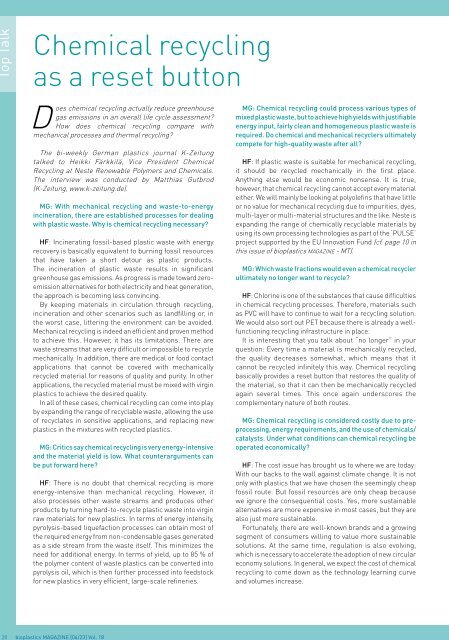Issue 04/2023
Highlights 100th issue Rebranding
Highlights
100th issue
Rebranding
Create successful ePaper yourself
Turn your PDF publications into a flip-book with our unique Google optimized e-Paper software.
28 bioplastics MAGAZINE [<strong>04</strong>/23] Vol. 18<br />
Top Talk<br />
Chemical recycling<br />
as a reset button<br />
D<br />
oes chemical recycling actually reduce greenhouse<br />
gas emissions in an overall life cycle assessment?<br />
How does chemical recycling compare with<br />
mechanical processes and thermal recycling?<br />
The bi-weekly German plastics journal K-Zeitung<br />
talked to Heikki Färkkilä, Vice President Chemical<br />
Recycling at Neste Renewable Polymers and Chemicals.<br />
The interview was conducted by Matthias Gutbrod<br />
(K-Zeitung, www.k-zeitung.de).<br />
MG: With mechanical recycling and waste-to-energy<br />
incineration, there are established processes for dealing<br />
with plastic waste. Why is chemical recycling necessary?<br />
HF: Incinerating fossil-based plastic waste with energy<br />
recovery is basically equivalent to burning fossil resources<br />
that have taken a short detour as plastic products.<br />
The incineration of plastic waste results in significant<br />
greenhouse gas emissions. As progress is made toward zeroemission<br />
alternatives for both electricity and heat generation,<br />
the approach is becoming less convincing.<br />
By keeping materials in circulation through recycling,<br />
incineration and other scenarios such as landfilling or, in<br />
the worst case, littering the environment can be avoided.<br />
Mechanical recycling is indeed an efficient and proven method<br />
to achieve this. However, it has its limitations. There are<br />
waste streams that are very difficult or impossible to recycle<br />
mechanically. In addition, there are medical or food contact<br />
applications that cannot be covered with mechanically<br />
recycled material for reasons of quality and purity. In other<br />
applications, the recycled material must be mixed with virgin<br />
plastics to achieve the desired quality.<br />
In all of these cases, chemical recycling can come into play<br />
by expanding the range of recyclable waste, allowing the use<br />
of recyclates in sensitive applications, and replacing new<br />
plastics in the mixtures with recycled plastics.<br />
MG: Critics say chemical recycling is very energy-intensive<br />
and the material yield is low. What counterarguments can<br />
be put forward here?<br />
HF: There is no doubt that chemical recycling is more<br />
energy-intensive than mechanical recycling. However, it<br />
also processes other waste streams and produces other<br />
products by turning hard-to-recycle plastic waste into virgin<br />
raw materials for new plastics. In terms of energy intensity,<br />
pyrolysis-based liquefaction processes can obtain most of<br />
the required energy from non-condensable gases generated<br />
as a side stream from the waste itself. This minimizes the<br />
need for additional energy. In terms of yield, up to 85 % of<br />
the polymer content of waste plastics can be converted into<br />
pyrolysis oil, which is then further processed into feedstock<br />
for new plastics in very efficient, large-scale refineries.<br />
MG: Chemical recycling could process various types of<br />
mixed plastic waste, but to achieve high yields with justifiable<br />
energy input, fairly clean and homogeneous plastic waste is<br />
required. Do chemical and mechanical recyclers ultimately<br />
compete for high-quality waste after all?<br />
HF: If plastic waste is suitable for mechanical recycling,<br />
it should be recycled mechanically in the first place.<br />
Anything else would be economic nonsense. It is true,<br />
however, that chemical recycling cannot accept every material<br />
either. We will mainly be looking at polyolefins that have little<br />
or no value for mechanical recycling due to impurities, dyes,<br />
multi-layer or multi-material structures and the like. Neste is<br />
expanding the range of chemically recyclable materials by<br />
using its own processing technologies as part of the ‘PULSE’<br />
project supported by the EU Innovation Fund (cf. page 10 in<br />
this issue of bioplastics MAGAZINE - MT).<br />
MG: Which waste fractions would even a chemical recycler<br />
ultimately no longer want to recycle?<br />
HF: Chlorine is one of the substances that cause difficulties<br />
in chemical recycling processes. Therefore, materials such<br />
as PVC will have to continue to wait for a recycling solution.<br />
We would also sort out PET because there is already a wellfunctioning<br />
recycling infrastructure in place.<br />
It is interesting that you talk about “no longer” in your<br />
question: Every time a material is mechanically recycled,<br />
the quality decreases somewhat, which means that it<br />
cannot be recycled infinitely this way. Chemical recycling<br />
basically provides a reset button that restores the quality of<br />
the material, so that it can then be mechanically recycled<br />
again several times. This once again underscores the<br />
complementary nature of both routes.<br />
MG: Chemical recycling is considered costly due to preprocessing,<br />
energy requirements, and the use of chemicals/<br />
catalysts. Under what conditions can chemical recycling be<br />
operated economically?<br />
HF: The cost issue has brought us to where we are today:<br />
With our backs to the wall against climate change. It is not<br />
only with plastics that we have chosen the seemingly cheap<br />
fossil route. But fossil resources are only cheap because<br />
we ignore the consequential costs. Yes, more sustainable<br />
alternatives are more expensive in most cases, but they are<br />
also just more sustainable.<br />
Fortunately, there are well-known brands and a growing<br />
segment of consumers willing to value more sustainable<br />
solutions. At the same time, regulation is also evolving,<br />
which is necessary to accelerate the adoption of new circular<br />
economy solutions. In general, we expect the cost of chemical<br />
recycling to come down as the technology learning curve<br />
and volumes increase.

















